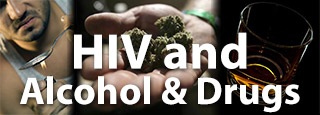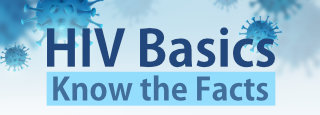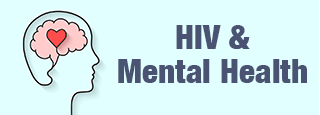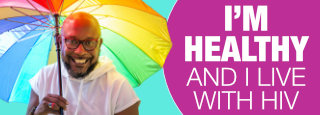HIV & Mental Health
If you are living with HIV, you may have been given plenty of guidance and treatment to improve your physical health but looking after your emotional and mental health is just as important.
There are many different types of mental health issues, such as depression, anxiety disorders, low self-esteem or personality disorders. This section helps cover the basics, along with where to get the support you need.
HIV & Mental Health
If you are living with HIV, you may have been given plenty of guidance and treatment to improve your physical health but looking after your emotional and mental health is just as important. There are many different types of mental health issues, such as depression, anxiety disorders, low self-esteem or personality disorders. This section helps cover the basics, along with where to get the support you need.
Quicklinks:

Mental Health
While the statistics show the difficulties that many people living with HIV face, it does not really tell the whole reality, many other things can compound our feelings. Covid and lockdowns have made things much tougher for many people, even more when we are not feeling our greatest.
What can you do to nurture your mental health?
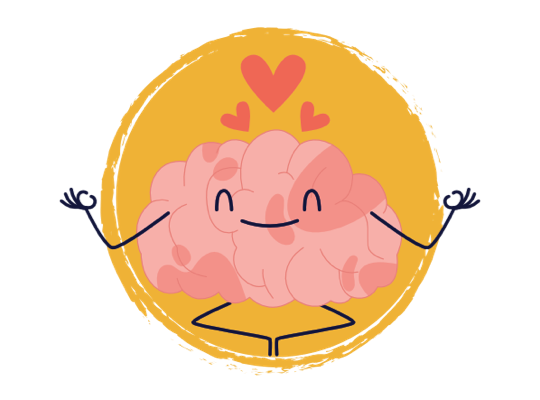
- having healthy relationships
- be part of your local community
- learning new hobbies/skills
- physical activity such as hiking, sports, yoga, etc. are always a good thing (work within your own limits, we are not all olympians!)
- getting out into nature (if you live in a city, head to a park for some space)
- a good night’s sleep always helps
- finding positive role models to hang with can help lift moods into a positive place.
Talk therapy is one of the most widely used, effective, and efficient methods for reducing mental distress and for increasing mental and emotional wellbeing. It can be chatting to friends, family or support people, it's not only about seeing a professional like a counsellor. However, that’s not to say it’s the only way to support mental health, or that you can’t combine several different ways. In fact, it’s actually a very good idea to be open and curious to the various ways that you can nurture your mental health. Some people volunteer and go to social events as a way to helping their mental health while getting extra support on those darker harder days we all face at times.
Activities to release stress
Gardening and being out in nature can calm your body and it often feels good to be outside in general, even on a bad weather day. If you do not have a garden of our own, there are community gardens you can volunteer at - side benefits are the veggies & fruit, and you'll make new friends that have a common interest as well.
Yoga, a self-soothing exercise that makes you feel like a human pretzel also helps you practice breathing techniques and meditation. This can be a great way to help self calm when you get that tight feeling in your chest from stress or anxiety. Apps are available to download for free, so you can do this in private at home, or head to a park and use headphones to get that feeling of extra space around you.
Exploring your local community, getting out and about to the numerous parks or shops around your home. Again, you can go it alone or organise a friend or two to come alone for the adventure. Some of the most prettiest places, best new food places, book/music stores have been found by people exploring locally.
Learning a new hobby that you haven’t tried before is another great way to de-stress. Lots of people like to cook dinner as a method of de-stressing from the day, and you get to see results of what you have done which can be extra rewarding.
There are numerous community activities and classes that take place weekly; Body Positive has +Social groups around the country. Or you could use the Meetup app to find whats going on in your area and what interests you. It's about what works for you.
Activities such as Massage Therapy, Meditation or Yoga can be a positive way of improving your mental health and manage stress. Body Positive provides a range of services within this space, check our events page for details.
When we are not in the best mental state, it can be easy to isolate ourselves from other people. We are creatures of connection so we desire to be heard and understood. To be heard when we are not feeling the best we need to find somewhere safe to talk about what’s going on in our mind.
It’s ok to reach out to a family member or a friend who you feel safe with. If this is not for you, there are multiple organisations with trained counsellors you can talk to, either by phone, in person or online.
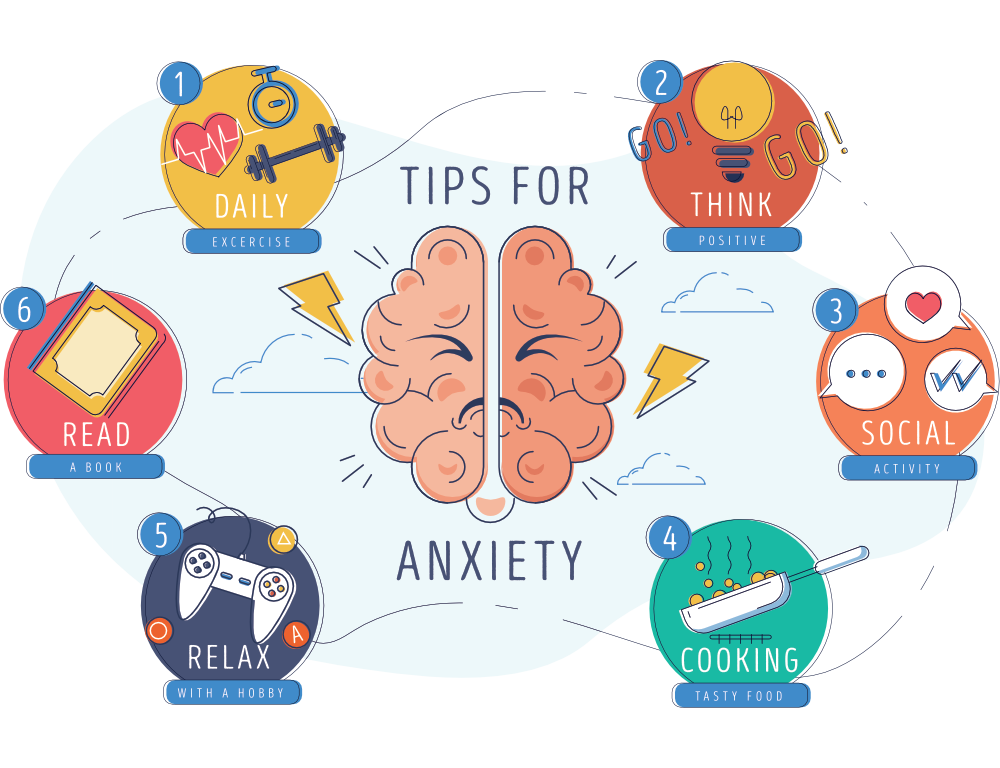
Is this depression or anxiety?
It is a huge range of negative feelings we can be experiencing and it can be overwhelming. Everyone’s experience is unique and personal to them.
Feeling down and miserable to feeling that there is no interest or pleasure in things, is a form of depression. Having times of panic, or always being on edge and worrying, is a form of anxiety. It’s quite common to experience a bit of both.
Whether you call it depression or anxiety, it doesn’t matter. What matters is that you understand what’s happening, and know what you can do to feel better.
Depression.org.nz has a self assessment tool as well as cultural specific wellbeing resources. The self assessment tool is easy to follow and really helpful to see at times that it's normal to feel depressed or have anxiety, but it's also good to know why and how to get help if we need it.
This information is a way to help you work through the tough times and find ways to live life to its fullest and be happy for who you are not matter what others think or say to/of you.
Explore this website with the idea of find new adventures in life to be happy in yourself. It's a challenge, but you have made it this far, you can go even further still. Don't forget you are not on this journey alone, others have had their own journeys and made it through. If it gets too hard, lean on a friend, find a Peer Navigator/Support person or get in contact with Body Positive as we are here to help. Being happy is the challenge in life, we all want and deserve this in life.
Want more info on depression and anxiety?
Head over to Gender Minorities Aotearoa under the section of mental health where you can find numerous reports and documents that are focused on the Rainbow community.
Depression.co.nz breaks down symptoms and causes of depression. They also have a section about anxiety. They also provide self-tests which can easily be done within ten minutes for both Depression and Anxiety.
Wellbeyond50 is another great website to get some insight into how HIV can affect us as we get older. Both depression and anxiety have been found to be higher with PLHIV and the LGBTQ+2 communities than the over all population. It's a simple easy website to read and explore while also giving information about how to find ways to work with life's issues.
Self-help Tools & Apps
- Mentemia was developed by All blacks legend and mental health advocate Sir John Kirwin and provides tools to make small daily steps that create big changes for your daily wellbeing
- Just a thought offers a quick online course to help with stress during Covid and currently offers currently offers the following free cognitive behaviour therapy courses: Generalised Anxiety, Depression and Mixed Depression and Anxiety.
- Melon Health provides a safe space to connect and support each other with self-care resources for our emotional wellbeing.
- Small Steps has tools to help with feelings of anxiety, stress, or low mood. Each tool only takes a few minutes.
- Whakatau Mai / The Wellbeing Sessions, by Changing Minds offer a wide range of free and online wellbeing sessions in real-time, helping to safely support your wellbeing from the comfort of your own space. These holistic sessions include topics such as yoga and fitness, art and poetry, journaling and meditation to mindfulness and various support groups, including one for LGBTQIA+. There are currently up to 11 sessions available per week.
- Aunty Dee is a free online tool for anyone who needs some help working through a problem or problems. It doesn’t matter what the problem is, you can use Aunty Dee to help you work it through.
- Headspace: Meditation and Sleep helps to teach you ways of mindfulness and meditation. There are plenty of guided meditations that helps with stress, anxiety, sleep, and personal growth.
LivLife provide positively thriving which is a frank and friendly content series made by people living with HIV for people living with HIV.
Bottoming is a podcast aimed towards the LGTBQ+ community in relation to mental health. The host, Brendan and Matthew, navigate difficult conversations and topics within their life while adding humour into it. Its about hitting rock bottom – not sex.
The Anxiety by Tim JP Collins talks about his own personal experience with anxiety, depression and panic attacks. The podcast holds numerous guests but also aim to answer questions that the listeners have sent through.
The Hardcore Self Help Podcast by Robert Duff who is a psychologist from Southern California . His work aims to take complex psychological issues and break them down into simple language to make the information more accessible and easier to understand.
Types of Mental Health Providers
Other people and mental health professionals may not be regulated in this way but can still be helpful to you. Listed here are some of the options for mental health care providers in New Zealand.
Psychotherapists can work in clinics, hospitals and private practice. These professionals have graduate level (Master’s) training but are not required to have medical or doctorate degrees.
Accessing Mental Health Services
Be curious about what’s out there and don't be afraid to advocate for yourself/ask for support to advocate for you to find the best provider for you. Most mental health care providers know that you need to find a good fit and they should understand if you need to try something different, somewhere else.
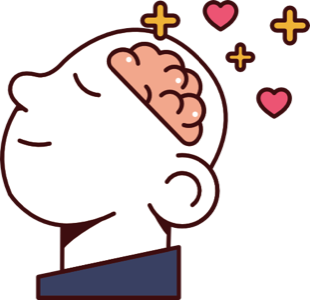
Affordability / Cost
- Check to see if there is funded programmes you can access.
- If you are using private insurance, check if you have coverage for therapy or mental health care through extended health benefits, if you have them (e.g., if you are working or attending school). Many plans include a set amount per year that you can spend on mental health care.
- Many workplaces also offer free counselling services through an employee assistance program (EAP). The EAP is an employee benefit program to assist employees with personal and/or work-related problems that may impact their ability to work, as well as their health and wellbeing. EAPs offer free, confidential assessments, referrals, short-term counselling, and follow-up services.
- Another good place to look for low-cost services is through local educational or training programs for mental health professionals. For instance, many universities with clinical psychology or counselling psychology programs run a community clinic where you can see a student trainee, who is supervised by a registered professional, for a reduced fee.
- With some private practitioners, you may be able to negotiate a reduced rate, also known as a “sliding scale fee.” However, if you can’t afford to see a private practitioner, there are also some options available at community health centres. There is a way to access a limited number of sessions paid for by WINZ if you qualify, you will need to ask the organisation if they use this process for their sessions. Although many of these services limit the number of sessions you will be able to attend, they can be great places to start. One downside, though, is that they can have long wait lists. Enquire with Body Positive Inc. how to apply for WINZ funding.
- Many peer support groups are free to attend and can be a wonderful source of support if you or a loved one are dealing with mental health challenges.
- It’s always helpful to have a close relationship with a general practitioner whom you trust. When you do have concerns about your mental health, you can ask them to help you sort through available options.
- If you’re comfortable doing so, try asking your friends and peers for support and recommendations about mental health services.
Where to start looking
In New Zealand some HIV/AIDS service organisations offer counselling services that can be relevant to you. Even if your mental health concerns are not specific to HIV or sexual health, getting connected with a counselling service can be a very effective gateway to support. These organisations are specially trained to deal with a range of issues affecting People Living with HIV. They may be able to help you navigate a complex mental health system and access services.
Professional associations are good options. Professional Associations are organisations that practitioners have to belong to in order to have the right to practice. Most Professional Associations publish directories of their registered, licensed practitioners. Professional Associations are not where people go to school, but they are organisations designed to protect the public from malpractice. So, any complaints of unprofessional, inappropriate or abusive care can be made directly the Professional Association. These associations typically have up-to-date directories of licensed practitioners. In New Zealand you can also lay a complaint with The Human Rights Commission, Health & Disabilities Services, and or directly with District Health Boards (DHB) depending on who the complaint is about and who they work for.
Who to contact for help?
In an Emergency
- Lifekeepers 1737 call or text 24/7
- Ministry of Health Crisis Assessment Teams (click here for the number to call in your area)
- Healthline (CATT Team) 0800 611 116 who are able to listen and provide immediate support.
- Suicide Helpline and Depression - 0800 111 757
- Lifeline Aotearoa - (call 0800 543 354), who are available 24/7 for support
- Emergency/Ambulance/fire/police – 111
bodypositive.org.nz
An organisation that provides support for PLHIV in New Zealand who are finding barriers within their lives: whether that be in relation to mental health, residency, work and income, treatment, and connecting with other PLHIV plus other services. Office hours: Monday to Wednesday 10am-5pm, Thursday 10am-6pm and Friday 10am-4pm.
depression.org.nz
Free phone call or text to trained individuals who focuses on depression and anxiety. They work alongside people of different ages and ethnicity and are available 24/7.
anxiety.org.nz
Is a non-profit organisation that seeks to provide support for individuals with anxiety disorder or are impacted by anxiety. Their phone line is available 24/7 for anyone that wants a safe space to talk.
outline.org.nz
A nation-wide helpline that is available 24/7. OutLine is an all-ages rainbow mental health organisation providing support to the rainbow community, their friends, whānau, and those questioning.
lifeline.org.nz
If you are wanting a safe space to talk, contact the Lifeline who have trained counsellors that are available 24/7.
ry.org.nz
Provides support for youth (up to the age of 27) in the Rainbow Community. Contact them for a confidential chat, they are happy to listen and provide you with information if needed.
health.govt.nz
The Government-organised phone line is available 24/7 and works to support anyone who is concerned about their mental well-being and their physical well-being.
1737.org.nz
A trained counsellor is available 24/7 to talk to you whenever you need it. There is an option to ask for peer support who have also experienced mental distress.
samaritans.org.nz
This organisation is a registered charity that is run by the community for the community. Their aim is to give a safe space for people to talk about what’s on their mind. They are confidential and are available 24/7.
safetotalk.nz
If you have experienced sexual harm and want to talk to someone about it, Safetotalk is a confidential phone service that gives you a safe space to talk. They can also provide you more information such as referrals or the procedure to a police report.
relationships.org.nz
Relationship Aotearoa has an expertise in couples counselling, family therapy, working with abuse and violence, working with youth at risk, and workplace issues. They have multiple trained counsellors and offer courses as well to help build strength in relationships.
pgf.nz
If gambling is taking/has taken a toll on your life, give this organisation a call between 8.30am to 5.00pm from Monday to Friday. Their site has an option to chat to someone online. There is a test available to see if your gambling has become harmful.
alcoholdrughelp.org.nz
Call or text to have a confidential chat with a counsellor who will be able to provide you support. There are other helplines dedicated to youth, Pasifika, and Māori in this page
aa.org.nz
Their website has lots of useful information about what the program holds and has a quiz that can help you figure out if alcohol is causing you and/or your loved ones harm.
victimsupport.org.nz
Victim support holds space for people who have been affected by suicide, trauma, and crime. Their aim is to support their clients through their healing process. Their phone lines are available 24/7.
drughelp.org.nz
Give them a call to find out how to control your meth use or visit their website where you can take a test to see how meth has impacted you.
nzaf.org.nz
This organisation has counselling available for PLHIV. To make a counselling session/appointment go to their website and complete the information.
areyouok.org.nz
An organisation there to help support with Family violence issues/matters.
They have sessions that strive to create a safe space for you to learn, share, discuss and connect with other people from all over Aotearoa, in real-time. Their aim is to create an accessible and inclusive space for all our guests. All their sessions are hosted on Zoom and are live.
Developed by The Ministry of Health. While this app is aimed at helping people cope with the Covid-19 pandemic, it has ideas and tools to help you learn how to be well and stay well throughout life. It helps you deal with common stressors (such as poor sleep, anxiety and stress).
This website provides cognitive behavioural self-help resources for a range of difficulties such as depression, worry, health anxiety, sleep, self-compassion – to name just a few. They provide quick information guides, worksheets and comprehensive modules
Beating the Blues is the most widely used evidence-based online CBT programme for relieving depression.
Just a thought Free online CBT and therapy for all New Zealanders. Courses for anxiety, depression and COVID related stress.
A CBT-based approach for wellbeing, anxiety and stress that has been adapted for Pasifika cultural groups by LeVa
A New Zealand CBT-based online resource for young people. It is a interactive game-world, designed to help young people who are feeling down.
This Australian based website discusses issues that affect PLHIV and ageing. It gives great insight into mental health issues, personal stories, sexual health, ageing conditions wellbeing, plus other topics.
Join Body Positive
Newsletter
Subscribe to our newsletter below by submitting your e-mail address.

